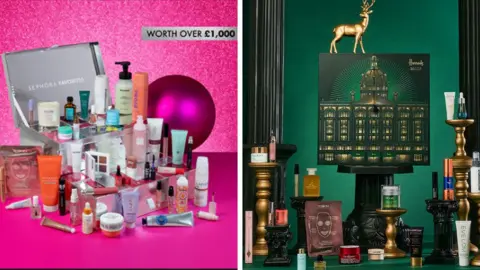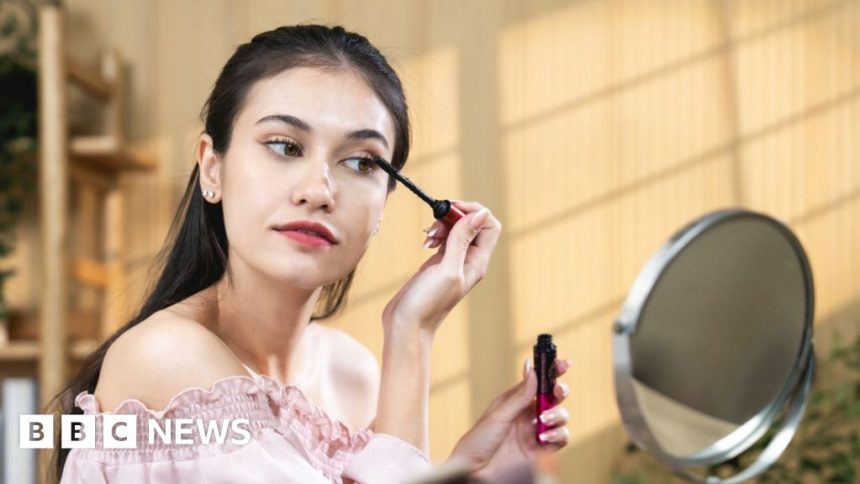Are luxury beauty advent calendars a rip-off?
 Getty Images
Getty ImagesThey’re all over your TikTok and Instagram – people unboxing the latest extravagant beauty advent calendar.
Influencers excitedly wonder what eyeliner, serum or hand cream will be behind door one, and gush over the beautiful box it has come in.
But are these products, which can cost hundreds of pounds, actually worth the money?
Yes, says TikToker Cissy Jones from Manchester.
We’re just over a week into November and the 27-year-old, who is a social media manager at fashion brand PrettyLittleThing but also makes TikToks on her personal account, has already posted a dozen advent calendar videos. Everything from chocolate, to beauty products and wine, and even a Pets At Home calendar for her dog.
“There’s one – the Harrods 12-day one – where every product in it is something that I would buy,” she says. “So I’m saving money.”
That idea of saving money is something that brands latch on to with their marketing. A calendar may cost £250 but it’s actually “worth £1,000”, they say, if you add up all the individual items.
“But you do have to want the actual products,” says Cissy. “Otherwise, it’s a bit of a waste of money.”
 Cissy Jones/TikTok
Cissy Jones/TikTokRetailers can afford to make such seemingly good offers because there’s a lot of margin built into beauty products, analysts say.
And rather than aiming to make a big profit on them, they view advent calendars as a marketing tool to get you to buy more products afterwards.
“A lot of retailers recognise advent calendars are a great way of getting new products to the consumer and a way to get them to convert,” says Natalie Berg from NBK Retail.
However, Sarah Johnson from Flourish Retail says that while there are many lovely bespoke calendars out there, “a lot [of companies] just use advent calendars to shift stock that may not be popular, rather than having to discount it”.
The size of the items in advent calendars can vary – with some offering full-sized bottles, some smaller versions, and some a mix of the two.
But smaller sizes may be what people want, says Ms Berg, as it’s common to want to try something out before fully committing.
Loraine Hogan has been buying beauty calendars for several years now. It’s something she and her daughter do together.
“There was a bit of excitement attached to getting a beauty calendar. It was something to share together around Christmas time. It’s our little treat.”
She believes they do represent value for money.
“You get to sample items people might not necessarily choose for themselves.”
With so many products out there, Cissy Jones’s advice is to look for a brand you like and to look for value for money, in terms of the total cost of all the items individually versus the price of the calendar.
However, even if a product may seem like good value for money, for some, spending more than £200 on an advent calendar is simply a luxury they cannot afford.
 Nihal
NihalAs a result, many scam websites have sprung up, trying to take advantage of people looking for a good deal on an expensive item.
Emma Jones and Nihal, who did not want us to use her last name, got in touch with the BBC after falling for fake adverts claiming to sell the Space NK £250 advent calendar for £28.99. Both women were attracted by the apparent discount, and say they would not pay full price.
“I wouldn’t feel comfortable spending that amount of money, mainly because I wouldn’t have that amount of spare cash,” says Emma.
“They can be very expensive – I’m not the type that would pay full price,” Nihal says.
“I don’t think it’s worth it. If you’re going to use every single product then maybe yes. But sometimes in these prepacked stuff, you’ll probably only use two or three of these products.”
But part of the reason beauty advent calendars are so popular is because shoppers still want to treat themselves, says Natalie Berg.
And many are willing to pay full price – and beyond.
 Sephora/Harrods
Sephora/HarrodsThe likes of Space NK, Harrods and Sephora have all sold out of their main calendars already.
The Harrods beauty calendar was priced at £250 but claimed to include items worth £1,600, while Sephora’s £199 calendar said it included items worth £1,000.
But you can find people selling them on eBay, asking for as much as £550 for the Harrods one and £399 for the Sephora one.
“It goes back to supply and demand – dynamic pricing,” says Sarah Johnson.
It might make sense to buy it even at an overinflated price, she says, if the retailer is sold out and you can’t get it anywhere else, especially if you perceive it as still making a saving on the total value of all the items.
This begs the question though of why firms don’t just make more.
Ms Johnson points out that it’s a seasonal product and they don’t want to over-order and be left with surplus stock that they would then have to discount.
Space NK told the BBC that it produced 30% more stock this year than last year but due to “unprecedented” demand still sold out within two and a half weeks. It plans to increase production next year.
Despite the expensive nature of beauty calendars, Ms Johnson says there is a “value perception” there.
“People could buy it to break it out and give [individual items] as gifts. There’s an element of people treating themselves and also being quite savvy and saving themselves money in the long run.”
With more and more of these calendars on sale now, there was a thought a few years ago that we might have reached “peak” advent calendar.
But Cissy disagrees – and thinks the opposite is the case.
“They always sell out every year, so I feel like there’s room for more.”








